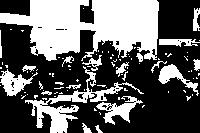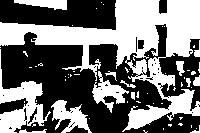
The third annual "Anything but Straight in Athletics" dinner Monday night in Daggett Lounge, Thorne Hall.
About 64 student athletes and student facilitators gathered in Daggett Lounge for the third annual “Anything but Straight in Athletics” dinner Monday night. Around tables, students discussed the environment for non-straight athletes at Bowdoin and devised ways to make their sports teams more welcoming to LGBTQ team members.
Six panelists also spoke about their experiences with homophobia, including three coaches: Paul “Hobie” Holbach, the women’s tennis coach; Chris Rossi ’10, assistant director of residential life; and Mike Connolly, the men’s baseball coach. Three student athletes related stories about coming out at Bowdoin or staying in the closet, and about their painful experiences with pejorative language.
Amy Hackett ’12 helped organize the event with Kate Stern, director of the Resource Center for Sexuality and Gender Diversity, and Jeff Ward, director of athletics. Hackett, who plays on Bowdoin’s basketball and softball teams, said when she attended the same event two years ago, her outlook dramatically changed.
“Hearing the anonymous story, I felt it was someone on one of my teams,” she recalled, referring to an autobiographical story by a closeted athlete that a peer had read aloud. “Knowing I was involved in creating an atmosphere that was making someone uncomfortable was really moving to me.”
Hackett now works for the Resource Center for Sexuality and Gender Diversity and, along with majoring in neuroscience, is minoring in gender and women’s studies. She said she hoped that Monday night’s event would raise students’ sensitivity to homophobia in their team cultures.
Stern said she also hoped the dinner would encourage more athletes to become Out Allies and Out Peers, students who are trained to support the LGBTQA community at Bowdoin.
The following is a summary of the panelists’ speeches:
“Hobie” Holbach told a story about getting lost on a 10,000-foot mountain with Colin Joyner ’03 and Bowdoin’s former men’s tennis coach. After scrabbling down a steep slope, they got trapped at the bottom of a ravine at 1 a.m., freezing cold and soaking wet. To stay awake and warm, they paced back and forth and told stories. At one point Joyner, who had known Holbach for years, confessed he was gay. “What do you think of that?” Joyner asked. Holbach responded, “Does it help us get us off this frickin’ mountain?” While they were happily rescued by helicopter the next day, Holbach said he was saddened that it took a life-threatening situation to convince Joyner to confide in him. “As a coach, I would be very sad if my players felt like they couldn’t open up to me or the other team members,” Holbach said.
Colin Ogilvie is a senior on the track team, which he calls his extended family. He recounted how as a freshman he hesitated to tell his teammates he was gay. Yet the longer he waited, the lonelier he became, he said. Finally, he gathered his courage and one-by-one approached his team members and said, “I’m gay. I got a shocked look, and then they were supportive. I kick myself for not doing it sooner.” He added, “If someone had brought up the topic of being gay or how being gay wouldn’t affect the team, it would have been easier.”
Casey Blossom ’13 read an anonymous story from a female student at Bowdoin who did not read it herself because she has not come out to her teammates. “I identify as gay just as much as I identify as an athlete,” the woman wrote, “but I’d feel like a burden if I made them deal with the issue.” She characterized her team as “girlie and hetero-normative” with conversations often revolving around dating and hooking up with guys. And while she knows they’re not trying to be cruel, she wrote that they use the word “˜gay’ as a synonym for stupid. “There’s almost an expected straightness to the team,” she said. “Being silent has allowed me to blend in, but it has created a lot of internal conflict in me. “¦ Personally, I feel disappointed about not coming out on my team.”
Chris Rossi ’10, a former Bowdoin hockey player, described the moment a team member told another player he was gay after being jokingly called “a faggot.” “I can’t imagine how much courage that took to say I’m gay in that environment,” Rossi said. The team decided collectively to stop using homophobic language. “None of that stuff matters,” Rossi said, about sexual preferences. “It didn’t help you get off the mountain,” he added, referring to Holbach’s story. “It’s about creating a human environment for your teammates.”

Mike Connolly recalled that when his longtime friend and former college teammate told Connolly he was gay, Connolly asked him why he hadn’t spoken up earlier. The friend answered that he had been deterred by their college team mates using “fag” as a put-down. “If I could go back, I would have wanted to be courageous,” Connolly confessed. “When someone said, “˜Quit fagging out,’ I would have found a way to say, “˜Not cool. Use another word.'”
Two lacrosse players, Will Horne ’14 and Mark Flibotte ’12, read Ben Chadwick “˜11’s story about being an openly gay lacrosse player at Bowdoin. Chadwick came out as a sophomore to his teammates, and “they all remained my friends and teammates,” he wrote. Then Horne recounted how he, as a freshman on the lacrosse team, had uttered homophobic slang, provoking an upperclassman player to pull him aside and warn him, “We don’t say that on this team.” Horne continued, “I never said those words again. Coming from high school, we’re all naïve.” Flibotte also described his own wake-up call. “No one was out in my high school. “¦ Coming to college, I never thought about having a gay teammate.” When he heard Chadwick tell the lacrosse team he was gay, Flibotte remembers laughing out loud, thinking it was a joke. Realizing Chadwick was serious, Flibotte said, “I felt so small and embarrassed.” Later he apologized to Chadwick, and Chadwick responded that it didn’t matter – he hadn’t heard because he had been so nervous.

I have never been more proud to be a graduate of Bowdoin (Class of ’63) than I was in attending the dinner with students and then the speech by Paul Tagliabue. I am very grateful to Jeff Ward, Kate Stern, Amy Hackett, the dinner panelists and, of course, Paul Tagliabue for an extraordinary program that should be replicated on as many college campuses as possible.